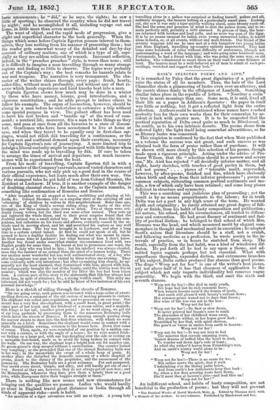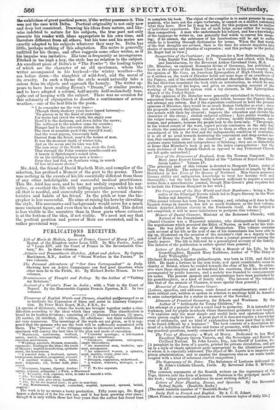MOIR'S SELECTED POEMS AND LIFE. * IT is remarked by Paley
that the great dignitaries of a profession raise the status of all its members. Thus, the halo of the Lord. Chancellor sheds a glimmering of lustre even over an attorney, and the curate shines dimly in the effulgence of Lambeth. Something similar takes place in the republic of letters. " Nosoitur a sociiii" is true in more meanings than one. Some men, it is said, lived all their life on a paper in Addison's Spectator : the paper in itself was little or nothing, but it got a reflected light from the entire collection. Authors could be mentioned whose names have reached posterity less for their own works than for their connexion by ac- cident or luck with greater men. It is to be suspected that the poetical reputation of Delta owed quite as much to Blackwood, in its zenith, as to his own intrinsic deserts. The poems shone from reflected light; the light itself being somewhat adventitious, so far as literary lustre was concerned. This suspicion is confirmed by the fact that when Moir published in a volume the success was not great, and such success as was attained took the form of praise rather than of purchase. It will be shown still more clearly by this selection of his poems, though made upon a rigorous principle. Acting under the advice of Pro- fessor Wilson, that the "selection should be a narrow and severe one," Mr. Aird has rejected "all decidedly inferior matter, and all slight, hasty sketches, 'with touches of good poetry in them, but yet not poems," . . . . pieces of "tolerable merit, superseded, however, by after-poems finished and fine, which have obviously taken birth and shape from their inferior predecessors"; poems on common subjects, reiterating common poetical sentiments and mo- rals, a few of which only have been retained; and some long pieces deficient in structure and symmetry.
This was a searching and judicious plan of proceeding; yet the result is by no means proportionate to the labour; for in truth Delta was not a poet in any high sense of the term. He wanted depth and originality ; he rarely attained any great degree of feli- city or finish, from his habit of hasty composition and publication; his nature, his school, and his circumstances, all tended to diffuse- ness and convention. He had great fluency of sentiment and faci- lity of poetical diction; he belonged to that school of which Mrs. Hemans was the head, and which measured merit by elegant com- monplace in thought and mechanical merit in execution; he adopted Scott's axiom that literature should be a staff, not a crutch, and following medicine as a profession, he wrote poetry in the in- tervals of practice, or in hours he snatched from sleep. The result, especially from the last habit, was a kind of wiredrawn dif- fusion. He put forth all he had to say upon a theme, and ad- mitted topics cognate perhaps but not essential. What with superfluous thoughts, expanded diction, and extraneous branches of his subject, Delta rather produced fine stanzas than good poems. The dirge "Weep not for her" is one of the writer's best pieces, yet not above half of it has that closeness of application to the subject which not only imparts individuality but removes vague generality. We begin with the third, and omit the sixth and seventh stanzas.
"Weep not for her !—She died in early youth,
Ere hope had lost its rich romantic hues ; When human bosoms seem'd the homes of truth, And earth still gleamed with beauty's radiant dews ; Her summer-prime waned not to days that freeze; Her wine of life was run not to the lees : Weep not for her !
"Weep not for her !—By fleet or slow decay, It never grieved her bosom's core to mark The playmates of her childhood wane away
Her prospects wither, or her hopes grow dark :
Translated by her God, with spirit shriven, She pass'd as 'twere in smiles from earth to heaven; Weep not for her !
"Weep not for her !—It was not hers to feel The miseries that corrode amassing years, 'Gainst dreams of baffled bliss the heart to steel, To wander sad down Age's vale of tears; As whirl the wither'd leaves from Friendsip's tree, And on earth's wintry world alone to be : Weep not for her ! • • • • "Weep not for her !—There is no cause for wo ; But rather nerve the spirit, that it walk ITnahrinking o'er the thorny paths below, And from earth's low defilements keep thee back : So, when a few fleet severing years have flown, She'll meet thee at heaven's gate—and lead thee on! Weep not for her !"
An indifferent school, and habits of hasty composition, are not beneficial to the production of poems ; but they will not prevent
• The Poetical Works of David Macbeth Moir, A. Edited by Thomas Aird; with a Memoir of the Author. In two volumes. Published by Blackwood and Son. the exhibition of great poetical power, if the writer possesses it. This was not the ease with Delta. Poetical originality is not only new and deep but consistent. Drawing his ideas from nature, and like- wise indebted to nature for his subjects, the true poet not only presents his reader with ideas appropriate to his own time, and therefore different from all others, but his tone and his metre are exactly adapted to his subjects whatever they may be. Delta has little, perhaps nothing of this adaptation. His metre is generally, unfitted for his theme, and often suggests some other writer, as if his impulse was imitative. His tone is frequently as incongruous. Pitched in too high a key, the style has no relation to the subject. An excellent piece of Delta's is "The Fowler "; the leading topics of which are the character of an old sportsman, whom the writer accompanied in his boyhood—the wintry weather—the sea before dawn—the slaughter of wild-fowl, and the moral of its cruelty. In such a theme the style would naturally .take a colour from its objects and approach the homely. The writer ap- pears to have been reading Byron's "Dream," or similar poems; and to have adopted a solemn, half-mystic half-melancholy tone, gsite out of keeping with the subject. There was no occasion for solemnity of objurgation to describe a continuance of severe weather,—one of the best bits in the poem.
"I do remember me the very time—
(Though thirty shadowy years have lapsed between)— 'Tis graven as by the hand of yesterday. For weeks had raved the winds, the angry seas Howl'd to the darkness, and down fallen the snows; The redbreast to the window came for crumbs ; Hunger had to the coleworts driven the hare ; The crow at noontide peck'd the travell'd road; And the wood-pigeon, timorously bold, Starved from the forest, near'd the homes of man.
It was the dreariest depth of winter-tide, And on the ocean and its isles was felt The iron sway of the North ; yea, even the fowl, That through the Polar summer months could see A beauty in Spitzbergen's naked isles,
Or on the drifting icebergs seek a home—
Even they had fled, on Southern wing, in search Of less inclement shores."
Mr. Aird, the friend of David Macbeth Moir, and compiler of the selection, has prefixed a Memoir of the poet to the poems. There was nothing in the events of his life essentially different from those of any other indefatigable and successful medical practitioner. This Mr. Aird has seen, and he has not unduly expanded his nar- rative, or overlaid the life with trifling particulars ; while he tells all that is needful, and successfully presents the personal charac- teristics and habits of his friend. In the pitch or tone the bio- grapher is less successfuL Ile aims at raising his hero by elevating the style. His accessories and backgrounds would serve for a much more eminent figure, and even then be a shade inflated. This defect is less visible in the narrative than in those parts where estimate is at the bottom of the idea, if not visible. We need not say that the poetical position and power of Moir are overrated, and in a rather provincial way.



























 Previous page
Previous page